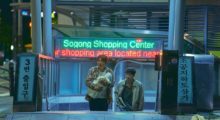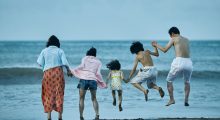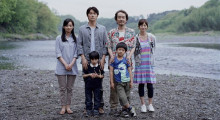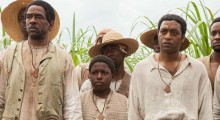Hirokazu Kore-eda
-
“I Wanted the Story to Start in a Downpour and End With Waves”: Hirokazu Kore-eda on Broker

What could be more heartless than selling abandoned babies? Hirokazu Kore-eda’s Broker asks just that, and against all odds, finds a way to understand how people could behave that way. It’s the Japanese writer-director’s first feature shot in South Korea, having most recently worked in France for his previous film La Vérité. Broker stars Song Kang-ho as Sang-hyeon, a tailor in debt to the mob, and Gang Dong-won as his younger business partner Dong-soo, an orphan. Using Dong-soo’s professional connection to a local church, the two begin covertly snatching babies from the building’s baby box, which people use to anonymously […]
by Daniel Eagan on Dec 30, 2022 -
Cannes 2022: The Awards, Close, Broker and Boy from Heaven

Only a couple of months after the Academy of Motion Picture Arts and Science’s completion of their decades-long endeavor to totally delegitimize the Oscars, Cannes provided another argument for doing away with all cinema awards entirely. The Vincent Lindon-led jury of nine couldn’t manage to make admirable choices even as they lauded virtually half the contenders in the field. Then again, at least one member of said jury admitted to not knowing who or how old Jerzy Skolimowski is until after the screening of his radiant EO—ex aequo winner, nevertheless, of the Jury Prize (something like third or fourth or […]
by Blake Williams on May 29, 2022 -
Hirokazu Kore-eda on the Lightness of Catherine Deneuve, Long Takes and Shooting The Truth

Hirokazu Kore-eda became one of world cinema’s leading directors in a series of films that over 20 years have examined family life with uncanny insight and sensitivity. After winning the Palme d’Or at the 71st Cannes Film Festival for Shoplifters, Kore-eda wrote, directed and edited The Truth (La Vérité), his first foreign-language feature. Starring Catherine Deneuve as Fabienne, a renowned French movie star, and Juliette Binoche as her daughter Lumir, a writer, the movie explores their relationship during the shooting of an art-house film. Ethan Hawke plays Hank, Lumir’s husband, an actor and recovering alcoholic. The Truth screened at the […]
by Daniel Eagan on Jul 3, 2020 -
“Infusion Of New Blood Is Necessary To Remain Viable”: Kore-eda Hirokazu Expands his Palette for Shoplifters

All Kore-eda films prior to Shoplifters (Manbiki Kozoku) involved families pushed together by blood or filiation, but for his new family of misfits crime is the only accord. They are a troop of scavengers who steal to survive, orphans, abandoners, and the abandoned, who’ve found each other. For the first time he tells the story of a family that chooses to be together. Drama arises from those characters not wanting to admit their motivations, as doing so might affirm no “real” family awaits their return. Kore-eda doesn’t know this story, though he’s shaped it through his life experience as much […]
by A.E. Hunt on Nov 23, 2018 -
Hirokazu Kore-eda on Crafting Shots and Scouting Locations for Like Father, Like Son

Hirokazu Kore-eda is a wanderer. The Japanese director, 51, has been known to disappear on set, leaving his cast and crew wondering where their maestro’s ventured off to. For instance, while making his 2008 masterpiece, Still Walking, Kore-eda vanished for a spell, only to discover the flowering trees that became an invaluable motif in the film. The director’s exploratory nature, which one might partly attribute to his background as a documentarian, has proven crucial in the poetic meticulousness of his exteriors. However, his visual instincts are hardly outdoor-exclusive, and his keenness for selecting ideal settings and compositions is just as […]
by R. Kurt Osenlund on Jan 17, 2014 -
NYFF Critic’s Notebook: 12 Years A Slave, Blue Is The Warmest Color, Like Father, Like Son

A substantial majority of the New York Film Festival slate is traditionally reserved for established auteurs and big-buzz festival titles. It might be better for adventurous film culture if NYFF and Cannes were to ditch the ballast of already established directors in favor of new and uncharted terrain, but that’s simply never going to happen and to protest otherwise is an unrealistic waste of time. (For those in the press corps, it’s also fun to bang through a dozen of the Year’s Most Important Releases in rapid sequence.) The U.S. premiere of Steve McQueen’s much-praised 12 Years A Slave may have […]
by Vadim Rizov on Oct 17, 2013 -
Cannes 2013: Kore-eda’s Like Father, Like Son and Miike’s Shield of Straw

Hirakazu Kore-eda’s Like Father, Like Son engages with questions of family and identity, exploring what it means to be a father, using a plot device in which children from two different families are switched at birth, a detail that is only discovered when the sons are about to enroll in school. The film’s primary point of identification is Ryota, a young father and ambitious businessman who strives to provide for his family and also to ensure that his son will have every opportunity for success. This desire for success is conveyed from the very opening shot, in which Ryota’s son, […]
by Chuck Tryon on May 21, 2013 -
Hirokazu Kore-eda on Still Walking
A connoisseur of longing and remembrance who brings great sensitivity to each of his reflective fables, Japan’s Hirokazu Kore-eda should be better known in the States, as his films extend the tradition of world-class artists like Naruse and Ozu. Enthralled with the operation of memory and the impact of grief on the lives of everyday people, Kore-eda has created a body of work that’s as rich with feeling as it is modest in tone. In Maborosi (1995), Kore-eda told the story of a quietly devastated young widow struggling to move on after her husband commits suicide. He then departed from […]
by Jason Guerrasio on Aug 26, 2009
